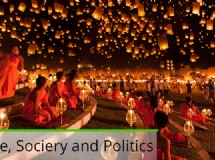Populist / Populism is a name retroactively given to the Russian intelligentsia who opposed the Tsarist regime and industrialization in the 1860s, 70s and 80s. Although the term is loose and covers a lot of different groups, overall the Populists wanted a better form of government for Russia than the existing Tsarist autocracy. They also feared the dehumanizing effects of the industrialization which was occurring in Western Europe, but which had so far largely left Russia alone.
The Populists were essentially pre-Marxist socialists, and believed that revolution and reform in the Russian empire must come through the peasants, who comprised 80% of the population.
The Populists idealized peasants and the ‘Mir’, the Russian agricultural village, and believed that the peasant commune was the perfect basis for a socialist society, allowing Russia to skip Marx’s bourgeois and urban stage. Populists believed that industrialization would destroy the Mir, which in fact offered the best route to socialism, by forcing peasants into crowded cities. Peasants were generally illiterate, uneducated and living just above subsistence level, while the Populists were generally educated members of the upper and middle classes.
Perhaps predictably, the peasants generally responded with suspicion, viewing the Populists as soft, interfering dreamers with no concept of real villages, and the movement made no inroads. In some locales, the Populists were arrested by the peasants and given to the police.
The Populists were essentially pre-Marxist socialists, and believed that revolution and reform in the Russian empire must come through the peasants, who comprised 80% of the population.
The Populists idealized peasants and the ‘Mir’, the Russian agricultural village, and believed that the peasant commune was the perfect basis for a socialist society, allowing Russia to skip Marx’s bourgeois and urban stage. Populists believed that industrialization would destroy the Mir, which in fact offered the best route to socialism, by forcing peasants into crowded cities. Peasants were generally illiterate, uneducated and living just above subsistence level, while the Populists were generally educated members of the upper and middle classes.
Going to the People
The Populists thus believed that it was their task to educate the peasants about revolution. Consequently, and inspired by an almost religious desire and belief in their powers of conversion, thousands of populists travelled to peasant villages to educate and inform them, as well as sometimes learn their ‘simple’ ways, in 1873-4. This practice became known as ‘Going to the People’, but it had no overall leadership and varied massively by location.Perhaps predictably, the peasants generally responded with suspicion, viewing the Populists as soft, interfering dreamers with no concept of real villages, and the movement made no inroads. In some locales, the Populists were arrested by the peasants and given to the police.
Terrorism
Unfortunately, some Populists reacted to this disappointment by radicalizing and turning to terrorism to try and promote revolution. Terrorism thus increased in the 1870s, reaching a nadir in 1881 when a small Populist group called ‘The People’s Will’ – the ‘people’ in question numbered around 400 in total – succeeded in assassinating Tsar Alexander II. As he had shown as interest in reform, the result was a massive blow to the Populist’s morale and power and a Tsarist regime which became more repressive and reactionary in revenge. After this the Populists faded away and transformed into other revolutionary groups, such as the Social Revolutionaries. However, other revolutionaries in Russia looked at the Populist’s terrorism with renewed interest.
SHARE







































